- Home
- Gavin Chappell
The Hadrian Legacy Page 4
The Hadrian Legacy Read online
Page 4
Junius Italicus cursed. ‘These robbers were just here to distract us.’ The men among the trees were advancing at a walk. As another cry rang out, the centurion tugged at the reins of his horse. ‘We’d better get back!’
‘Alright, centurion,’ Flaminius said calmly. He turned to the frightened slaves. ‘Withdraw to the carriage. But no running!’ he added in a bellow as several slaves dropped the clubs they’d been carrying and sprinted back around the corner.
He sawed at his reins and followed by Junius Italicus, and the braver slaves including the Hispanian, keeping watch on the advancing bagaudae as they went.
They came around the corner to see the slaves who had run standing stock still. More scruffy men on ponies surrounded the rest of the cavalcade, and one of them—a man in a helmet—was threatening a terrified Marcius Magnus with a spear.
Even as Flaminius’ hoofs splashed through a muddy puddle, Corvus opened the door of the carriage, wearing the hood of his cloak up for warmth. Behind him Epasias sat, looking perfectly composed. Flaminius realised that the source of the high-pitched shrieking had been Marcius Magnus.
‘Corvus!’ the tribune shouted. ‘Get back in the carriage!’
But as Junius Italicus and the rest of the slaves joined Flaminius, the procurator stepped down from the carriage. He dropped his hood.
A murmur ran through the assembled bagaudae. The one with the spear snatched it back. Sawing at his reins, the bagauda rode from the scene so hastily his helmet fell from his head. It was ridden over by his fellows as they followed him into the trees.
The thudding of their hoofs died away. Only the moaning of the wind was audible. Distantly, like an echo, came the sound of the other bagaudae riding away.
Fastidiously, Corvus replaced his hood and retreated into the carriage, slamming the door behind him. Epasias spoke to him at length in what Flaminius took to be Gaulish. Marcius Magnus had fainted in his saddle, and two of the slaves went to revive him.
Dismounting, Junius Italicus went to investigate the mud where the riders had galloped off into the trees. He picked something up and placed it under his cloak.
Corvus thrust his head out of the window again. ‘Drive on,’ he told the slave who drove the carriage.
Flaminius rode alongside Junius Italicus.
‘That was a narrow escape,’ the centurion remarked.
Flaminius couldn’t work out if he was being sarcastic. ‘Looks like those bagaudae just didn’t like the procurator’s face. What was it that you picked up from the mud?’
Junius Italicus lifted his cloak to reveal the helmet the lead bagauda had been wearing. ‘Military issue,’ he said, ‘on the Gaulish pattern. This is the kind of helmet worn by Gaulish auxiliaries.’
They rode on in the direction of the Roman road.
Flaminius let the implications sink in. The previous procurator had been murdered by Gaulish auxiliaries. Now a murder attempt had been made on his replacement, by Gaulish bagaudae, at least one of whom was a Gaulish deserter, or had obtained his armour from an auxiliary quartermaster, one way or the other.
Or had he been a genuine auxiliary? Had they all been auxiliaries, disguised as bagaudae? In which case, whose orders were they acting on? Had the same mastermind been at the back of the murder of Appius Pulcher? Yet the evidence—the serpent’s egg—suggested that druids had been responsible. And that surely meant the Caledonians.
He remembered his earlier service in Britain. The Caledonian druids had been at the back of everything. But they had been conspiring with the governor, Quintus Pompeius Falco, aiding him in his attempt to seize the empire. Falco was now proconsul of Asia, having apparently renounced the conspiracy. He had only been a pawn, so it was unlikely he was connected with anything happening in Britain now. As for the other conspirators, whoever they really were, they seemed to have no real interest in Britain, only in the empire as a whole. No, this new business seemed to be confined to druids and Gaulish auxiliaries.
Gaul had once been under the sway of druidic superstation, but surely that was all in the past. Probus, though, had said something about druids meeting in forest groves. Had the bagaudae who’d attacked them been druids?
Coming out onto the Roman road they rode north, up a river valley.
Flaminius nervously studied the wooded heights on either side. After a quarter of a mile a patrol of legionaries marched past, going the other way. The centurion leading them returned Flaminius’ salute smartly, and also saluted Corvus. Although the latter was a civilian, only a man of high office would be travelling along a Roman road with a military escort.
Surely no bagaudae, druids, or deserters would be so bold as to attack them on a busy highway such as this. But Flaminius felt ill at ease until they rode into the courtyard of a waystation at the end of the day’s journey. He breathed a sigh of relief as the gates closed behind them.
Later, relaxing in the bathhouse of the waystation, he nerved himself to ask Corvus about the attack.
‘Why did they turn and run when you got out of the carriage?’ he asked.
Corvus was rising from the cold plunge bath when Flaminius addressed him. The new procurator was by no means a fine figure of a man, resembling a gladiator gone to seed. He smiled superciliously at Flaminius and led the tribune into the sauna. They sat down on a stone bench and allowed the steam to open their pores. Marcius Magnus was already there, sweating profusely. He greeted them with a flap of the hand but said nothing.
‘I suppose they simple recognised my authority,’ Corvus mused.
‘Who’s that?’ Marcius Magnus asked. Corvus explained. The clerk shuddered and his flaccid body wobbled. ‘The entire business was terrifying,’ he declared. ‘No wonder I prefer to stay in one place. Why can’t you get a more stable career, you old fool, instead of dragging me the length and breadth of the empire?’
Corvus laughed as if it was all a joke, and slapped the clerk on his flabby back, but Marcius Magnus looked indignant.
‘My centurion thinks they may have been deserters,’ Flaminius added.
Corvus’ head snapped up and he stared at Flaminius.
‘Deserters?’ he said. ‘You mean legionaries?’
Flaminius shrugged. ‘Or auxiliaries,’ he said. ‘Gaulish auxiliaries.’
‘Why would Gaulish auxiliaries, deserters or not, take to the forest and live as bagaudae?’ Marcius Magnus asked.
‘Why would Gaulish auxiliaries murder the procurator of the province of Britain?’ Flaminius countered.
Corvus’ eyes narrowed. ‘A good question, tribune,’ he said finally. ‘One I intend to ponder—in the hot baths.’
He strode from the sauna.
For the next few days travelled north across Gaul. The road took them into the heartland of the province, then down to the coast, which they reached after a little over a week of travelling. In Gesoriacum they took to the waters, crossing the ocean in a galley rowed by slaves. After a day’s sail they entered the estuary of the Tamesis, one of the three great rivers of Britain. The journey by ship was luxurious compared with any Flaminius had previously experienced, but as they disembarked in the rain soaked town of Londinium their reception was magnificent.
—7—
Londinium, Britain, 13 May
Flaminius stood in the prow with Corvus and his coterie—except for Epasias, who was below, still suffering from the seasickness that had assailed her when they came aboard. Pilot boats guided them to the wharf on the north bank. Through the rain that hissed down, he saw a sizeable settlement, above which curled smoke from many cooking fires and hearths. It was a few years since he had last been here, and signs of new building were on every side.
Although of lesser importance than the provincial capital, Camulodunum, Londinium was of tactical significance due to its central position in the road network; this was why the procurator’s palace had been built here, a short walk from the wharf where their galley moored. But to get there they had to pass a welcoming committee.
&n
bsp; At the bottom of the gangplank, a fussy little man in a drenched equestrian toga came to meet Corvus and spoke to him earnestly in an undertone. As he led them all up from the muddy wharves, there was a flourish of trumpets. Legionaries in best dress uniform lined the street, their armour and weaponry gleaming despite the rain. Crowds of civilians stood outside the pillars and porticoes of a massive basilica.
A man in tribune’s uniform came forward and shook the procurator’s hand vigorously, shaking off drips as he did so.
‘Welcome to Londinium, sir,’ he said, wiping rain from his face. ‘I’m Vibius Metellus, newly promoted commander of your personal guard. We came down from the Wall when we heard you were on our way. You find the town amid renovation, as I’m sure your subordinate’—he glanced at the fussy little man— ‘has explained. Before he left, His Imperial Majesty initiated a series of important building programmes.’ Metellus’ face grew sombre. ‘I only wish I could greet you under happier circumstances.’
Corvus stared at him in puzzlement. ‘Oh! You mean the murder of my predecessor? Yes, a tragic event. Shall we go inside?’
Metellus went on, regardless of the rain. ‘Investigations are being made into the guards’ conduct. I may assure you that now I have taken command, after my predecessor’s dismissal, discipline is paramount. We still don’t know why the assassins struck. Dumnorix’s Troop has been confined to barracks for the moment, and the governor is awaiting the arrival of an official investigator from Rome.’
Flaminius saluted soggily. ‘Tribune Flaminius,’ he introduced himself, ‘of the Commissary.’
Metellus didn’t salute. The Commissary was feared and distrusted by the few Romans who had heard of it. No one liked a spy, Flaminius thought wryly.
‘Platorius Nepos is himself on his way south,’ Metellus said, returning his attention to Corvus, ‘to meet you, sir, and consult with you on your role in the province. In the meantime, I’m to take you to your palace. Please follow me.’
The guards fell into step behind the procurator as they passed down the street. Flaminius remembered Londinium as an undistinguished town, but everywhere they went he saw signs of the emperor’s renovations; new temples, new palaces—just like Augustus in Rome, Hadrian had found Londinium brick and left it marble.
They halted at the gates of a large palace on the banks of a stream. A huge column lifted high above the streets, bearing a bronze statue of Hadrian. Flaminius glanced up at the larger than life countenance, which stared coldly northwards over the sea of dripping red tiled roofs and shivered, remembering his only encounter with the most powerful man in the world. A crucified convict hung from a tall wooden cross, but his head was bowed, as if in reverence to the imperial statue. A crow stood at one end of the cross, speculatively eyeing its still living burden.
Metellus led them into the courtyard of the palace, where slaves greeted them and took them to quarters that had been prepared for them. A few hours later, dry, washed and refreshed, Flaminius joined the procurator and his entourage for dinner.
‘There you are, old fellow,’ said Corvus as Flaminius took his couch and washed his hands in ice water provided by a slave. ‘We were just discussing your investigation. I thought the Commissary concerned itself with nothing more exciting than procuring grain for the legions!’
Flaminius looked startled. ‘I’d prefer it if you’d not talk about it,’ he said. ‘Tongues wag and walls have ears.’
Epasias laughed throatily. ‘Such suspicious minds you must develop, working as an imperial agent.’
Corvus gnawed delicately at a fowl. ‘We have news of the governor. Platorius Nepos is at Camulodunum. No doubt he will reach Londinium presently. Once he has briefed me, you may return with him to the Wall and begin your hush-hush investigations.’
‘I’d like to speak with your guards first,’ Flaminius said. ‘Which of them was present when the murder took place?’
Corvus stared at him. ‘My dear fellow, it’s no use asking me,’ he said. ‘All I could tell you is that my predecessor left the accounts in an appalling state. Talk to Metellus. He’s just over there.’
The tribune looked up. ‘Ah, the Commissary agent,’ he said. ‘Speak to Centurion Aquila. He was present at the procurator’s death, and he questioned the auxiliaries, for all the good it’s done. None of them provided any useful intelligence even under torture.’
‘I hope to use more effective methods,’ Flaminius said.
Metellus shrugged. ‘They are under guard up in Onnum.’
‘On the Wall?’ Flaminius asked. ‘Very well, my centurion and I will accompany the governor when he returns.’ It would be quicker if he went north straightaway, but reporting to Platorius Nepos would be diplomatic.
‘Your centurion interests me strangely,’ Corvus commented.
‘Junius Italicus?’ Flaminius hadn’t thought the procurator deigned to notice non-commissioned officers. ‘Do you want to speak to him? I think he’s staying in the camp.’
There’d been no fortress in Londinium the last time he’d passed through; now there was one northwest of the stream. It lay beyond the amphitheatre, which had been rebuilt in stone since Flaminius’ last visit; both innovations were Hadrian’s work.
‘He and I have something in common,’ Corvus went on in mysterious tones. ‘We are both soldiers.’
Flaminius was baffled. Junius Italicus was a soldier, no doubt of it, but Corvus wouldn’t last ten seconds in the legions.
‘I see your confusion,’ Corvus added, with a laugh. ‘You’ve not been out East, unlike your centurion and me. There are mysteries out there. Mysteries I would wish to share with you.’
‘Do you think that’s wise?’ Epasias hissed.
Flaminius looked from one to the other. There was a mystery here, alright. And he was determined to fathom it. What connection it had with the death of the previous procurator he would only learn when he found the clue to lead him through the labyrinth. But what did Junius Italicus have to do with it? Probus trusted him. Flaminius trusted him. The centurion had nothing to do with Corvus and his eccentric coterie. Or had he?
‘I think it’s very wise,’ Corvus said. ‘I’m sure Flaminius would make a good soldier.’
‘I’ve been with the legions a few years now,’ Flaminius said. ‘I’ve had my ups and downs, but I think my commanding officer is the one to decide if I’m a good soldier or not.’
Corvus smiled. ‘A soldier,’ he said, eyes bright, ‘of the Lord.’
‘The Lord? Lord who?’
‘The Lord of Light, of course,’ said Metellus suddenly. He too had the same scar on his forehead—the one shared by Junius Italicus and the procurator. Were they all in on this, whatever it was? The tribune reached over and shook Corvus’ hand in a comradely manner.
‘I don’t understand,’ Flaminius said. He felt that they were making a fool of him, and he resented it.
Corvus laid a soft hand on his shoulder. ‘Very soon,’ he assured him in a murmur, ‘you will do. You’ll be sent for, in the first watch of the night, and all will become clear to you.’ He looked over at Metellus. ‘You will join us, Brother Soldier?’
The tribune of the guard nodded. ‘It’s time our brother was enlightened.’
For the rest of the meal Flaminius was silent. What was happening? Would he really have the secret divulged to him? He would learn why the last procurator had been murdered... or would he? As soon as possible, he made his excuses and retired to his chamber. Here he entertained himself with a copy of Petronius’ Satyricon which he’d found in the palace library misfiled under ‘Virgil.’ As he read it, he was filled with genuine regret for having left Baiae before the season started.
He woke suddenly. It was dark, and outside the rain still hissed down. He lay fully clothed across his bed, the scroll beside him. On his desk his candle had burnt down to the merest flicker. What had awoken him?
A dark shape momentarily blotted out the gleam from the shuttered window and crouched down at his side.<
br />
‘Sir?’ It was Junius Italicus’ hoarse voice. ‘Sir, I’ve been asked to take you there.’
‘Where?’ Flaminius said groggily. ‘Where are you taking me?’
‘The mystery, sir,’ the centurion whispered, rising as Flaminius sat up. ‘You’ve got to learn the truth. Come with me, sir.’
‘What’s going on?’ Flaminius demanded. The centurion’s face was grim in the guttering light.
‘I can’t say, sir,’ he said. ‘Put this on.’ He thrust something into Flaminius’ hands. It looked like a hood. Flaminius pulled it on to discover that it covered his eyes.
‘I can’t see,’ he objected.
‘I’ll guide you, sir,’ Junius Italicus promised.
The hood stank of stale vomit. Hands grasped him by the arms—not Junius Italicus, there must be someone else in the room—and he was urged down a flight of steps.
He stumbled blindly out into the cold, rain-soaked night, hearing his feet crunch on gravel and splash in puddles, feeling the rain drench his clothes. On either side and from up ahead, he heard splashing footsteps.
The voices echoed, the rain cut out, and the cold grew intense. They had gone indoors again—or underground.
They halted. Silence fell. In the distance, Flaminius heard a drip of water, a crackle of fire and muted chanting. A pungent, heady aroma drifted through the rough weave of the stinking hood. Where were they?
Someone tore the hood from his face. Blinking in the ruddy light of torches, Flaminius looked around him. He was standing in a cold, gloomy chamber. Starlight filtered in from behind him; ahead, seemingly down a long tunnel, yellow light was visible.
Dark figures surrounded Flaminius, each with a cowl covering its face. Another cowled figure beckoned to them, and Flaminius was bundled forward.
The figure led them down a stone stairway. They came out into a high-vaulted cave, its walls illuminated by many flickering candles. Cowled figures lined the walls. Distant sounds of chanting beat upon the tribune’s mind like surf on a desert shore. A short flight of steps led down to another level. Beyond this, a metal grille lay in the floor.

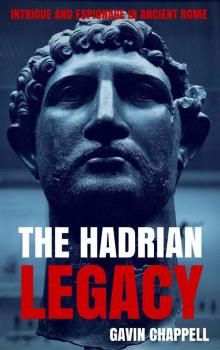 The Hadrian Legacy
The Hadrian Legacy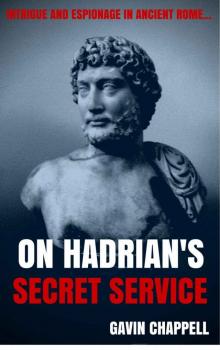 On Hadrian's Secret Service
On Hadrian's Secret Service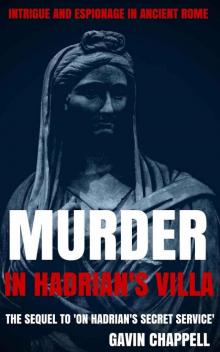 Murder in Hadrian's Villa
Murder in Hadrian's Villa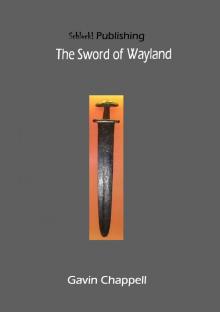 The Sword of Wayland
The Sword of Wayland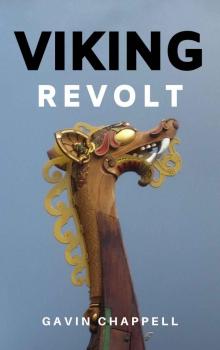 Viking Revolt
Viking Revolt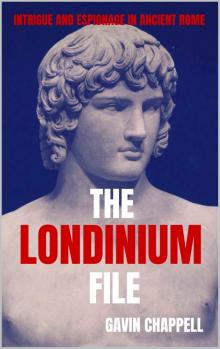 The Londinium File
The Londinium File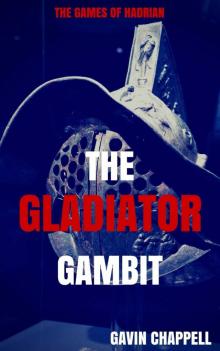 The Gladiator Gambit
The Gladiator Gambit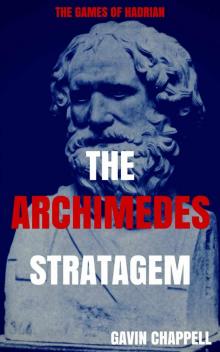 The Archimedes Stratagem
The Archimedes Stratagem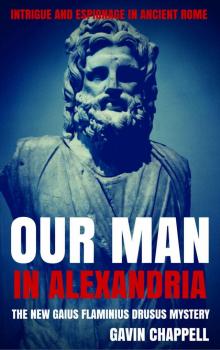 Our Man in Alexandria
Our Man in Alexandria Into the Void (The Dungeoneers)
Into the Void (The Dungeoneers)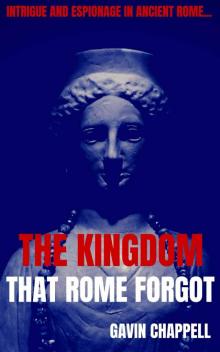 The Kingdom That Rome Forgot
The Kingdom That Rome Forgot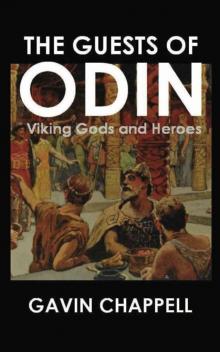 The Guests of Odin
The Guests of Odin